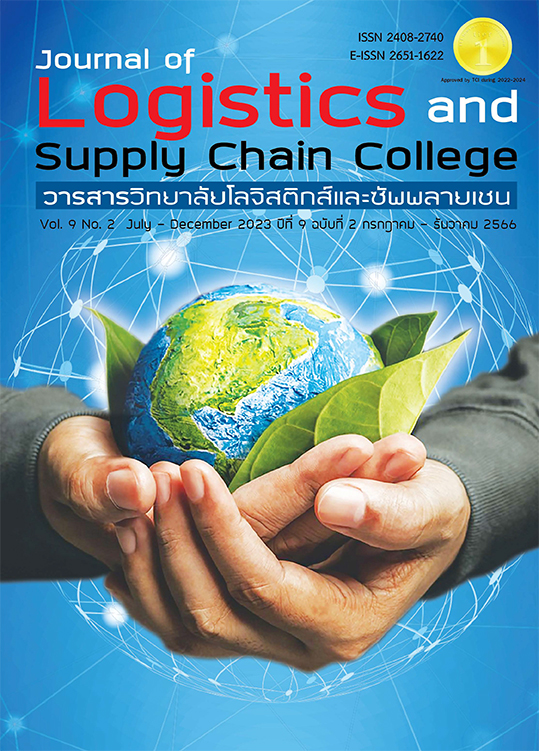The Factors Affecting the Financial Adjustment of People in Suphanburi Province under the Situation of the Coronavirus Disease 2019 Pandemic
DOI:
https://doi.org/10.53848/jlscc.v9i2.262594Keywords:
Predictive Equation, Financial Adjustment, Coronavirus Disease 2019Abstract
The purposes of this research were to 1) analyze the level of personal financial management factors and the level of financial adjustment. 2) To analyze the personal finance management factors that affected the financial adjustment of people in Suphanburi province under the situation of the coronavirus disease 2019 pandemic. The research model was quantitative and used questionnaires for the instrument. The samples were 400 people who have occupations in Suphanburi Province and were used for non-probability sampling by accidental sampling. The data were analyzed by mean, standard deviation and stepwise multiple regression analysis. The results found that 1) the level of personal finance management factors and the level of financial adjustment overall were at a high level. 2) Personal finance management factors that affected the financial adjustment of people in Suphanburi province under the situation of the coronavirus disease 2019 pandemic consisted of the government’s remedial measures of the financial sector, the attitudes towards financial management, the influence of reference groups and family financial responsibilities. The predictive power was at 69.00 percent. The finding can be used as a guide for organizations to support people's quality of life in formulating public assistance policies. Additionally, it includes the implementation of development, promotion of knowledge, understanding, and raising awareness of the importance of personal financial management to adapt to future changes in economic uncertainty, epidemics, disasters, or other emergencies.
References
กอบชัย นิกรพิทยา และวุฒิพล ฉัตรจรัสกุล. (2562). ปัจจัยที่มีความสัมพันธ์กับพฤติกรรมการปรับตัวด้านการเงินของภาคครัวเรือนในเขตอำเภอเมือง จังหวั มหาสารคาม. วารสารสถาบันวิจัยและพัฒนา มหาวิทยาลัยราชภัฏมหาสารคาม, 6(1), 39-52.
กัลยา วานิชย์บัญชา. (2559). การวิเคราะห์สถิติ: สถิติสำหรับบริหารและวิจัย. พิมพ์ครั้งที่ 16. กรุงเทพฯ: จุฬาลงกรณ์มหาวิทยาลัย.
ชนิกานต์ ภูกัณหา. (2563). ปัจจัยที่ส่งผลต่อการปรับตัวด้านการเงินของบุคลากรสำนักงานการตรวจเงินแผ่นดิน. ค้นเมื่อ 27 มิถุนายน 2565, จาก: https://mmm.ru.ac.th/MMM/IS/vlt151/6114993620.pdf.
ณัฎฐวรรณ คำแสน. (2564). ความรู้ ทัศนคติ และพฤติกรรมในการป้องกันตนเองจากการติดเชื้อไวรัสโควิด-19 ของประชาชนในเขตอำเภออู่ทอง จังหวัดสุพรรณบุรี. วารสารวิทยาลัยพยาบาลพระจอมเกล้า จงั หวดัเพชรบุรี. 4(1), 33-48.
ธนภรณ์ ดีธนกิจชัยกุล. (2563). ปัจจัยที่มีผลต่อการวางแผนทางการเงินส่วนบุคคลของคนวัยทำงานในสถานการณ์ COVID19-. ค้นเมื่อ 25 มิถุนายน 2565, จาก: http://www.mbafinabstract.ru.ac.th/AbstractPdf/1605157199_2-1-2562.pdf.
นัคมน อ่อนพุทธา, วิมล หลักรัตน์, ญาณิศา ศรีบุญเรือง และจักรพันธ์ โสมะเกษตริน. (2561). การจัดการการเงินในครัวเรือนของประชาชนในเขตตำบลฟ้าหยาดอำเภอมหาชนะชัย จังหวัดยโสธร. วารสารวิชาการมหาวิทยาลัยราชภัฏศรีสะเกษ, 12(1), 40-50.
ปราณ สุวรรณทัต. (2564). วางแผนก่อนใช้ ไม่อดตายแน่นอน เปิด 5 วิธีบริหารเรื่องเงินยังไง ภายใต้วิกฤตโควิด19-. ค้นเมื่อ 10 กรกฎาคม 2564, จาก: https://brandinside.asia/money-managementduring-covid19-/.
ปรีญานุช บุตรนํ้าเพชร. (2563). ปัจจัยที่มีผลต่อสถานะทางการเงินส่วนบุคคลในช่วงสถานการณ์ COVID19-ของประชากรในกรุงเทพมหานคร. ค้นเมื่อ 27 มิถุนายน 2565, จาก: https://mmm.ru.ac.th/MMM/IS/vlt6114993637/1-15.pdf.
พีระ ทองโพธิ์. (2561). แนวทางการเพิ่มประสิทธิภาพการช่วยเหลือเยียวยาผู้ได้รับผลกระทบจากเหตุการณ์ความรุนแรงทางการเมือง. รายงานการวิจัยหลักสูตรการป้องกันราชอาณาจักร, วิทยาลัยป้องกันราชอาณาจักร.
วิวรรณ ธาราหิรัญโชติ. (2563). จัดการการเงินยามสถานการณ์ฉุกเฉิน. ค้นเมื่อ 10 กรกฎาคม 2564, จาก https://www.bangkokbiznews.com/blog/detail/649660.
สยานนท์ สหุนันต์. (2561). พฤติกรรมการบริหารจัดการเงินส่วนบุคคลของนักศึกษาวิทยาลัยดุสิตธานี พัทยา.วารสารวิทยาลัยดุสิตธานี, 12(2), 369-383.
สำนักงานแรงงานจังหวัดสุพรรณบุรี. (2564). รายงานสถานการณ์แรงงานจังหวัดสุพรรณบุรี ไตรมาสที่ 1 เดือนมกราคม – มีนาคม 2564. ค้นเมื่อ 11 กรกฎาคม 2564, จาก: https://suphanburi.mol.go.th.
สุทิน ชนะบุญ. (2560). สถิติและการวิเคราะห์ข้อมูลในงานวิจัยเบื้องต้น. ค้นเมื่อ 19 มิถุนายน 2565, จาก:http://kkpho.go.th/km/index.php/2017-08-10-06-37-01/category/2-r2r-5.
เสาวลักษม์ กิตติประภัสร, ธรรมวิทย์ เทอดอุดมธรรม, พราวภวินท์ พักตร์ธนาปกรณ์ และพัชราภรณ์ ศอกจะบก. (2563). ผลกระทบทางสังคมจากการระบาดของเชื้อไวรัสโคโรนา 2019 (COVID-19) และวิกฤตเศรษฐกิจ. รายงานวิจัยสำนักงานปลัดกระทรวงการพัฒนาสังคมและความมั่นคงของมนุษย์.
เอกดนัย ธิมาชัย, (2560). กระบวนการถ่ายทอดทางสังคมเชิงวิชาชีพสู่การเป็นผู้ตรวจพิสูจน์หลักฐานมืออาชีพ: กรณีศึกษากองพิสูจน์หลักฐานกลาง. ปริญญาวิทยาศาสตรมหาบัณฑิต สาขาวิชาการวิจัยพฤติกรรมศาสตร์ประยุกต์, มหาวิทยาลัยศรีนครินทรวิโรฒ.
Best, J. W. (2006). Research in Education. 10th ed.New Jersey: Prentice Hall.
Kaneda, M., Kubota, S., & Tanaka, S. (2021). Who spent their COVID-19 stimulus payment?Evidence from personal finance software in Japan. The Japanese Economic Review, 1-29.
Listiani, K. (2017). Pengaruh financial knowledge, locus of control dan financial attitude terhadap financial management behavior pada mahasiswa. Doctoral dissertation education program in management study, STIE Perbanas Surabaya.
Priantinah, D., Aisyah, M. N., & Nurim, Y. (2018). The Analysis of Technology Acceptance. Retrived 10 July 2022, From: https://www.atlantis-press.com/proceedings/icobame-18/125911581.
Yamane, Taro. (1973). Statistics: An Introductory Analysis (3rd ed.). New York: Harper and Row Publication.
Yap, R. J. C., Komalasari, F., & Hadiansah, I. (2018). The effect of financial literacy and attitude on financial management behavior and satisfaction. BISNIS & BIROKRASI: Jurnal Ilmu Administrasi dan Organisasi i, 23(3), 139-146. DOI: 10.20476/jbb.v23i3.9175.



